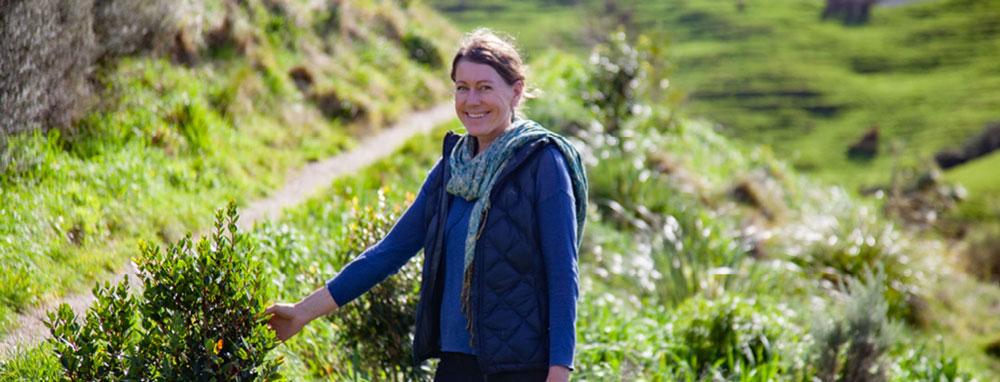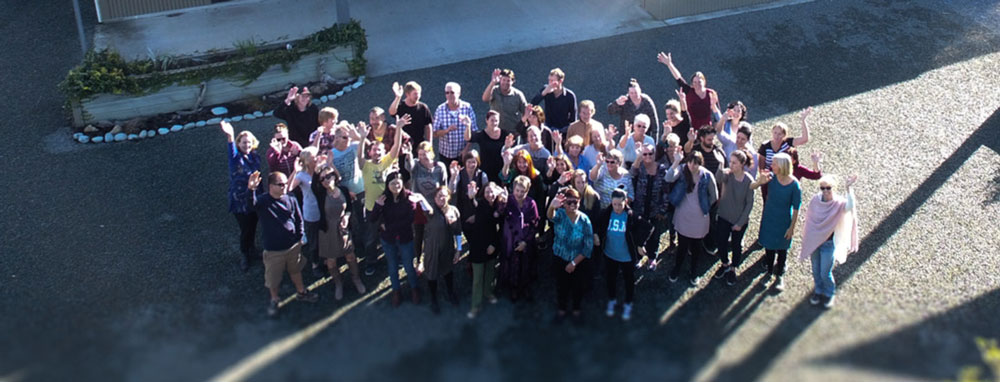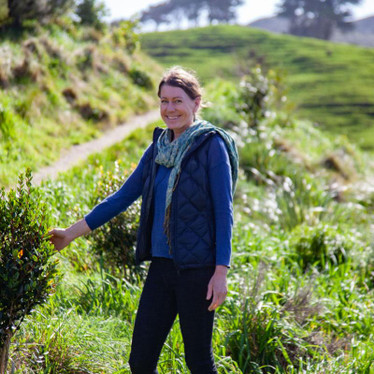
We chatted to Values Lead, Lucy Butler, who shares why we’ve made the conscious choice to invest in the regeneration of local native forests in Aotearoa. She shares what’s ahead for reducing and offsetting our carbon footprint, and what people like you – and businesses who care for our planet – can do to make a difference.
Hi Lucy, please tell us how HealthPost measures its carbon footprint?
To achieve Zero Carbon certification with Ekos, we carefully measure our carbon footprint and offset our direct and indirect emissions from our business operations and parcel deliveries.
We began working with Ekos to measure, reduce and offset our emissions in 2020. Developing a robust understanding of our emissions profile and taking action on climate is central to delivering on our vision to have a lasting positive impact on people and the planet. HealthPost’s total Greenhouse Gas Emissions for the 2024 financial year were 771.40 tonnes of CO2e.
HealthPost’s emission have reduced 12.26% in the past year.
Our major emissions areas for FY24 were:
- 72.6% Upstream freight emissions – parcel deliveries
- 11.8% Fuel and energy related emissions (well-to-tank emissions largely associated with our parcel deliveries)
- 9.65% Staff commuting
- 1.5% Business travel
- 2.6% End of life - courier packaging and packaging materials.
All other emissions categories are less then 2% of our total footprint.
While our total emissions are down 5.2% from the base year (2021) largely due to reduced trading within the market, we have also made changes to our overall reporting in 2023 to gain a more holistic, transparent view of our overall emissions. This includes capturing staff commuting data for the first time. This new initiative is one of the ways we're seeking to more accurately measure and reduce our day-to-day emissions for a lighter footprint.
Our carbon footprint is made up of Scope 2 and 3 emissions – this means they are indirect emissions related to our business activities, such as imported energy (scope 2) and transportation (scope 3) rather than from sources that we control directly, like owned generators or manufacturing plants.
How does HealthPost reduce its carbon footprint?
We continually invest in gathering the most complete data possible to inform our our reduction efforts.
In the past year we’ve focussed particularly on waste reduction and recycling efforts on site. We have managed to reduce our overall waste emission by 25% since 2023 (and by 70% since 2021!).
We have also achieved reductions in business travel, purchased electricity and staff commuting.
Our 2024 emissions report gives us our second year of staff commuting data, which is one of the significant emissions groups that we can influence through cultural and practical changes. We have reduced staff commuting emissions by almost 2% in the past year. We offer flexible work-from-home days each week and encourage car-pooling where possible. We have a strict travel policy and only sign off critical inter-office travel.
New climate-friendly community initiatives in 2024 include:
- Partnering with the Sustainable Living Centre to support the Kai Resilience Project with the preservation and storage of surplus produce to be distributed around the local community.
- Joining the Advisory Board for the creation of a cycleway between Takaka and Collingwood. This would enable more of our team and many others to cycle to work safely.
- We have just commenced a large expansion of our solar array at our Collingwood operations hub, which will see us transition from producing 20% of our own power to almost 100%.
We have continued working with suppliers to include their scope 1 and 2 carbon data in our reporting, and we are now offsetting emissions from purchased goods from Antipodes, Lifestream, and Weleda and now Douglas. We’ll keep working with our top supplier brands to encourage greater carbon awareness and accountability within our industry.
We’re working closely with NZ Post on emissions reduction as outbound freight (plus associated well to tank emissions) is more than 80% of our overall emissions. NZ Post has bold targets for 2030 and we are currently working with them to support EVs and EV charging for our courier run. With a demonstrated five-year commitment to measurement, offsetting and reduction, we are one of their key clients showing leadership in this area.
We have also conducted a review of our current courier packaging from a carbon perspective and plan to trial changes in the coming year that would lead to meaningful emissions reductions.
How are HealthPost’s carbon emissions offset?
In 2024 we offset our emissions through a mix of carbon units generated from the Kahiwi Carbon Farm on Arapaoa Island in the Marlborough Sounds. We offset using only New Zealand Carbon Units (NZUs) produced by native forest projects in Te Tauihu (Top of the South) which are then retired in the New Zealand Carbon register.
FY24 is our third year of investing in the Kahiwi Carbon native forest regeneration project in the Marlborough Sounds. We visit the forest regularly to see the regeneration in action. The native forests of Aotearoa may be relatively slow growing but can continue to expand their capacity to store carbon for centuries. This is the kind of legacy we want to be a part of creating.
Regenerating native ecosystems through our offsetting is aligned with our hands-on approach to restoring biodiversity. For 13 years we’ve been planting native trees as a team around Mohua Golden Bay - more than 16,000 trees and counting. We also undertake extensive revegetation work through the HealthPost Nature Trust. We work to restore indigenous ecosystems so taonga species thrive.
The trees we plant as a team and via the Nature Trust are over and above our official carbon offsetting, which happens exclusively through government-issued carbon units, to keep things fully transparent and verifiable.
Native forest NZUs attract a high premium over credits generated from international or non-indigenous projects and they’re generally regarded as the gold standard for offsetting in Aotearoa. The high cost of offsetting in this way provides additional incentive to hold ourselves accountable to our carbon reduction goals.
Looking ahead, how does HealthPost plan to offset its carbon emissions in the future?
The plan is to continue investing in Kahiwi Carbon Farm on Arapaoa Island in the Marlborough Sounds. This is a project of regenerating native bush adjacent to Long Island where Pakahā chicks are sourced for translocation to the Wharariki Ecosanctuary so protecting biodiversity there helps with our HealthPost Nature Trust efforts to regenerate nature here in Mohua Golden Bay.
Arapaoa is biodiversity-rich and predator control efforts have just ramped up with hopes to reintroduce the little spotted kiwi and protect threatened gecko and giant snail populations. Biodiversity loss and climate change are inextricably linked so it’s important to us that we support indigenous forest projects that create habitat for native flora and fauna.
The HealthPost Nature Trust has been part of studying the ‘blue carbon’ potential of Mohua Golden Bay’s seagrass meadows – an estimated 25% of Aotearoa New Zealand’s total. We’ve supported the Tasman Environmental Trust’s ‘Core & Restore’ project to explore this area’s carbon storage potential. You can learn more about our blue carbon efforts here.
What should conscious consumers look out for to help reduce their carbon footprint when shopping with us?
Shop Your Way allows you to filter by values most important to you – including our carbon neutral and climate positive brands. You can also discover who shares your ethical values through Mindful Brands – which celebrates brands leading the way in the areas of Social Responsibility, Transparency, Eco Packaging, and Environmental Sustainability.
Shopping with us helps create positive change as we actively work to influence greater carbon-accountability in our supply chain. Our strict range standards and transparent product information helps our customers across the board to shop in an environmentally-conscious way.
We are now a certified B Corp. B Corp independently assesses our carbon and environmental commitments along with many other aspects of being a values-led business. Reputable independent certifications are an excellent way to see that businesses are walking their talk, and we’re proud to have plenty of other great B Corps in our range.
To hear directly from B Corp brand founders on how to create positive change when you shop, tune in to our Choose Well with HealthPost podcast episode “Greenwashing – what to look out for so you can choose mindfully”, featuring two B Corp brand founders – Bo Hendgen from Absolute Essential and Florence Van Dyke from Chia Sisters and New Zealand Trade and Enterprise.
What three lessons have you learned through the Zero Carbon certification process with Ekos?
- Partnerships are a must for meaningful climate impact – Supply chain influence is crucial and we have to work collaboratively, including through networks like Businesses for Climate Action, where we can connect with like-minded businesses on the challenges e.g. getting greener freight options for our Nelson-Tasman region.
- Carbon accountancy is a specialist business – It took two years of working with Ekos to create an accurate freight calculation methodology for our business – which set best-practice in New Zealand and is now being refined further. Getting the most accurate and complete carbon data is worth investing in so you can confidently factor carbon into business decision-making.
- Be in it for the long haul – Each successive year we improve our data and create a fuller picture of our carbon footprint. We also build relationships with supply partners around carbon through successive conversations – for us to account for our indirect emissions, we need our supply partners to be measuring their own footprints. These conversations drive shared responsibility and positive change. It’s a work-in-progress!
What has becoming Zero Carbon certified meant for HealthPost?
Being Zero Carbon communicates in an independently verified way to our customers, team, brand and partner suppliers and community that we are taking responsibility for our climate impact, which is vital to achieving our vision of having a lasting, positive impact on the wellbeing of people and the planet.
Our independent certification allows us to connect with other like-minded businesses who are taking their climate impact seriously. Working with the experts at Ekos has enabled us to develop a much deeper understanding of our carbon emissions and the ways we can make a difference in this constantly evolving and critically important area.
What's one piece of advice to share with other businesses starting out on their carbon journey?
Carbon can feel complex and overwhelming, so we recommend creating opportunities for hands-on local action (like planting trees!) to make your climate impact tangible for your team and wider community. Engagement is key: you want your team to be thinking in terms of carbon, whether they are procuring IT equipment or composting teabags in the lunchroom – every action and decision within a business counts.

| Discover our Zero Carbon journey → |

